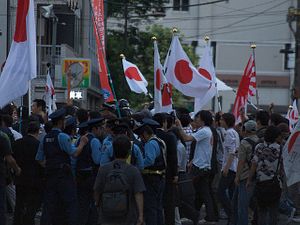In Tokyo’s Korean district, Shin-Okubo, there have been an increasing number of demonstrations from groups of civilians protesting the privileged rights for the “zainichi” community, those of Korean descent in Japan. The slogans range from “Get out of our country” to “Kill them all.”
There are a number of right-wing organizations across Japan that organize such demonstrations. Beyond anti-Korea protests, they are known to generally oppose multicultural coexistence, ultimately because it could lead to the enfranchisement of foreign residents. Sendai, the largest city in Northern Japan, has been in negotiations with China to import pandas for its zoo. The talks have prompted a large ultranationalist backlash, because “it is clear that this will lead to foreigners’ participation in local politics,” according to their website.
Many countries have right-wing organizations. But whereas countries such as Germany, the U.K., France, and Australia prohibit hate speech, defined as the expression of hatred based on nationality, race, or religion, hate speech in Japan is seen as protected by the constitutional right to free speech. In that regard, Japan is similar to the U.S., although in the U.S. case law has marked out some clearly defined exceptions to protected speech.
In Japan, Anti-Korea protests have thrived in Shin-Okubo, particularly last year when in June a right-wing group protested privileges granted to the Korean community in Japan. A fight broke out between this group and an opposing liberal organization that seeks to rid the country of racist speech, and a total of eight people from both sides were arrested.
On July 24, the U.N. Human Rights Committee made a recommendation to the Japanese government to ban all expressed advocacy of racial supremacy or hatred, with penalties for violations. The committee also claimed that victims of hate speech in Japan have “insufficient protection.” Traditionally, the Japanese government has been reluctant to act on this because it could interfere with laws protecting freedom of speech.
Now, however, Japan might be ready to reconsider its position. In December 2009, several right-wing organizations held a protest against the Kyoto Korean School for using the neighborhood’s public park. Members of these groups stood outside the school on a Friday afternoon with megaphones shouting racially offensive remarks, for instance claiming that the school was full of the children of spies, and demanding that they leave Japan. The demonstrations went on for a while, until the groups were eventually the target of litigation in Kyoto. Although the ultranationalists argued that the demonstrations were permitted under the constitutional right to freedom of speech, the court ruled late last year that hate speech was not protected within a school area, and ordered the groups to pay around 12 million yen ($116,000) in damages. The court based its ruling on the antidiscrimination section in the Japanese Constitution.
This recent ruling, along with growing public recognition that hate speech is becoming a problem, suggest that a debate over how to reconcile hate speech with free speech may well be in Japan’s near future.

































